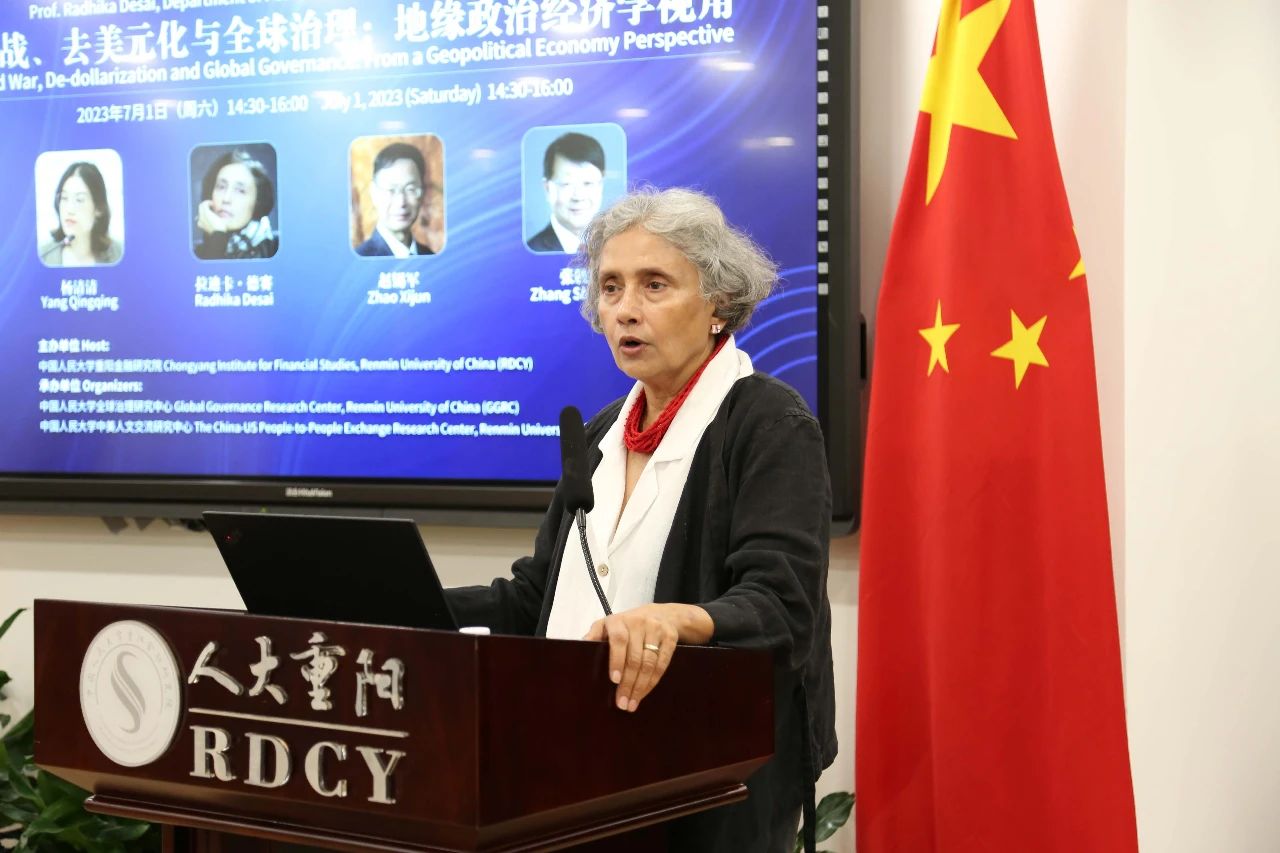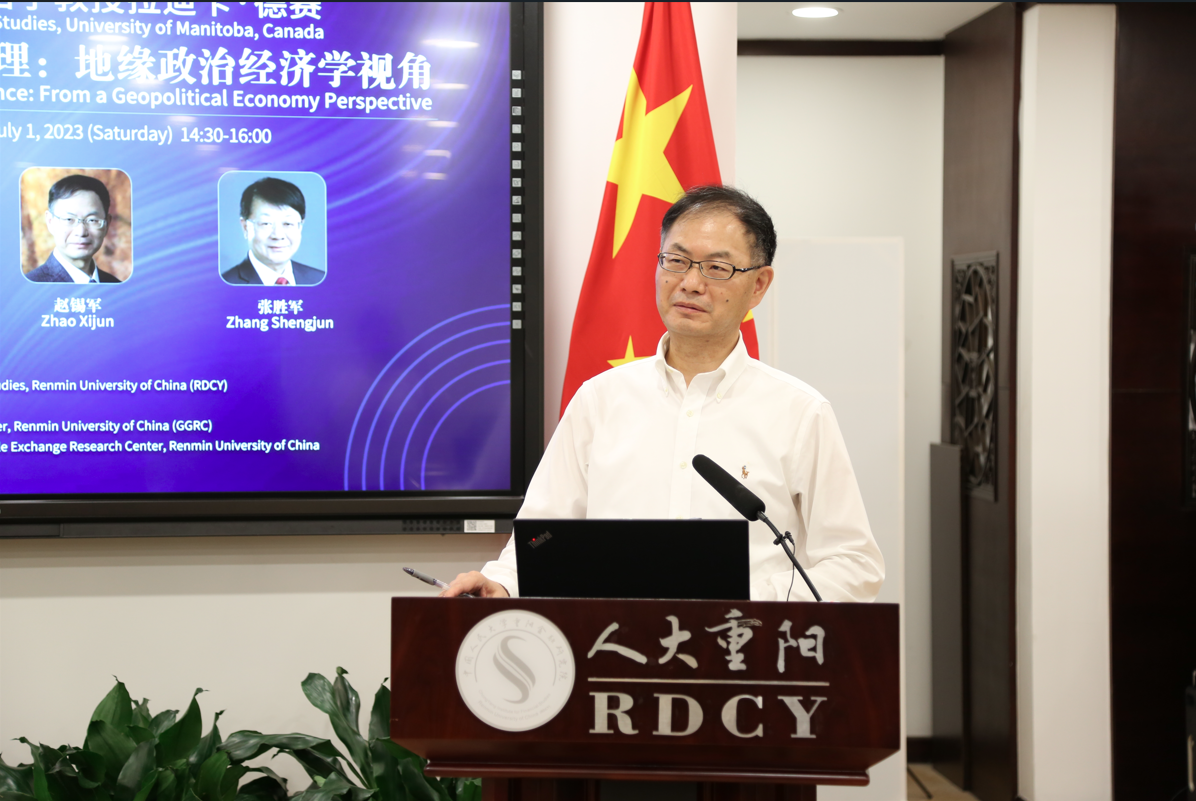LATEST INSIGHTS
Your Present Location: LATEST INSIGHTSCanadian Scholar Prof. Radhika Desai Warns: To Maintain the Hegemony of the US dollar, the United States is about to Get Tough
On July 1, 2023, Ms. Radhika Desai, Professor at the Department of Political Studies and Director of Geopolitical Economy Research Group at University of Manitoba in Canada, was invited to attend the "RDCY Global Governance Forum (Summer 2023)" hosted by the Chongyang Institute for Financial Studies at Renmin University of China (RDCY) and organized by the Global Governance Research Center of Renmin University of China (RUC) and the China-US People-to-People Exchange Research Center of Renmin University of China, delivering a keynote speech on "New Cold War, De-dollarization and Global Governance: From a Geopolitical Economy Perspective", and having an in-depth exchange of views with Chinese experts and scholars on the New Cold War, de-dollarization, and geopolitical economy. Wide media have covered this forum, including Beijing Daily, China Social Science News, Zhejiang Daily, and Shenzhen TV etc,.

The lecture was hosted by Ms. Yang Qingqing, Deputy Dean of RDCY. She opened the lecture by highlighting Prof. Radhika Desai's achievements in joint research, think tank construction and international exchange with RDCY in the past three years, and expressed appreciation for her fruitful achievements in the field of geopolitical and economic research, which had contributed a lot to the current international issues research.
Subsequently, Prof. Desai shared her views on the current international situation of the New Cold War, the challenges of the dollar-centered international monetary system, global governance and so on. According to Desai, the "de-dollarization" monetary policy is a highly conflicted system, since there are also internal contradictions within the dollar system in addition to the widely discussed external challenges. In fact, the U.S. economic position in the world is declining and its mixed frontier development field is also in a full-scale regression. The U.S. domestic economy has also seen a decline in productivity, and inequality has reached unprecedented level, causing a lot of social conflicts. She believes that in order to maintain its global hegemony and shift its domestic risks, the United States is taking strong measures worldwide and launching a new Cold War.
According to Desai, at present there is no "global state", so there cannot be a "global state capitalism", nor is there a so-called "world currency". The sterling system was an imperial currency, not a national currency or world currency. The weakening of the sterling system, on the one hand, prompted US ruling classes to aspire to replace it with the dollar system; on the other hand, it also signified the role of various factors, with communism and decolonization marking the weakening of imperialism. It also meant that there was always instability in the dollar system. The United States could never export capital without vast tribute-paying colonies. She also highlighted the "Triffin dilemma", pointing out the paradox of the dollar's role as both a national currency and the world's reserve currency, and that the liquidity of dollars fuels global trade, which implies a persistent U.S. deficit, thus undermining confidence in the dollar and its role as a reserve currency and leading to instability. As a result, many countries are watching to see if a new international monetary system will emerge.
Prof. Desai believes a stable, just and developmental international monetary system should meet the following six key elements: firstly, capital controls; secondly, multilateralism (not imperial dominance); thirdly, it is geared to trade and investment needs, not financial speculation; fourthly, creditor responsibility alongside debtor responsibility; fifthly, surplus country responsibility alongside deficit country responsibility; and sixthly, it focuses on balance.
Later, two Chinese scholars, Mr. Zhao Xijun, Co-Director of China Capital Market Research Institute of Renmin University of China(CCMRI) and Senior Fellow of RDCY, and Mr. Zhang Shengjun, Director of Global Governance Research Center at the School of Government of Beijing Normal University and Senior Fellow of RDCY, commented in the discussion session.
Zhao Xijun said that Prof. Desai has enriched the research of the international monetary system by comparing the U.S. dollar System and Sterling System. The dollar system does play the role of allocating capital, guiding or driving the cross-border flow of the international capital through the flow of the dollar in the international capital market and the international financial market. Since peaking at 40%, the U.S. share of the world economy has fallen to about 25%, and the flaws in the operation of the dollar system are becoming more apparent. There are also some new changes, as the dollar weaponization, it introduced many financial sanctions, which actually undermine the foundation of the dollar system. The internationalization of RMB will also face some contradictions and problems faced by the US dollar. However, if the fundamental contradictions between the national currency acting as the international currency can not be resolved, then its sustainability and stability will be difficult to maintain.

According to Zhang Shengjun, Prof. Desai is a "truth teller", and her speech is an expose and critique of American neoliberalism. He believes that "American-style global governance" is in fact carried out in three ways. The first is to create crises, such as the financial crisis; the second is to wage wars, such as some regional military operations; and the third is to seize wealth from the Third World. In fact, the United States is more dependent on the world than we think, and it is easy to understand why Secretary of State Antony J. Blinken and Treasury Secretary Janet L. Yellen were so eager to come to China and negotiate with China some time ago. As China and other developing countries uphold a firm rejection of neoliberalism since the Cold War, the United States is likely to respond with more drastic measures.

In the Q&A session, Prof. Desai answered a number of questions from the audience on the New Cold War, neoliberalism, artificial intelligence and advice to China. The atmosphere was very warm.
On the question of "why the U.S. stigmatizes China", Prof. Desai said that there is no doubt that the West will launch a New Cold War by stigmatizing other countries. Because the U.S. has adopted policies that ignore the interests of some emerging economies and the inequalities brought about by financial development, and it is because of these policies, which have put the American people in very great miseries, that the people voted for Trump, but what could a politician like Trump bring them? Instead of finding out what’s wrong with such policies as neoliberalism, the Trump administration, and now the Biden administration, have chosen to deflect attention and let China take the blame for all these problems in the U.S., leading to the stigmatization of China.
Prof. Desai also argued that China's innovation momentum and technological development, even being curbed, has developed intelligently and creatively. The current U.S.-dominated innovation system is very disappointing and has no way of encouraging real innovation, let alone the innovation the world needs.
Dr. Radhika Desai is Professor at the Department of Political Studies and Director of Geopolitical Economy Research Group at University of Manitoba, Canada. She has proposed a new historical materialist approach to understanding world affairs, geopolitical economy, based on the materiality of nations. Some of her recent books include Geopolitical Economy: After US Hegemony, Globalization and Empire (2013), Karl Polanyi and Twenty First Century Capitalism (2020) Revolutions (2020) and Japan’s Secular Stagnation (2022). Her articles and book chapters appear in international scholarly journals and edited volumes. With Alan Freeman, she co-edits the Geopolitical Economy book series with Manchester University Press and the Future of Capitalism book series with Pluto Press. Her Latest books is Capitalism, Coronavirus and War: A Geopolitical Economy (2022) which is open access.























































































 京公网安备 11010802037854号
京公网安备 11010802037854号





